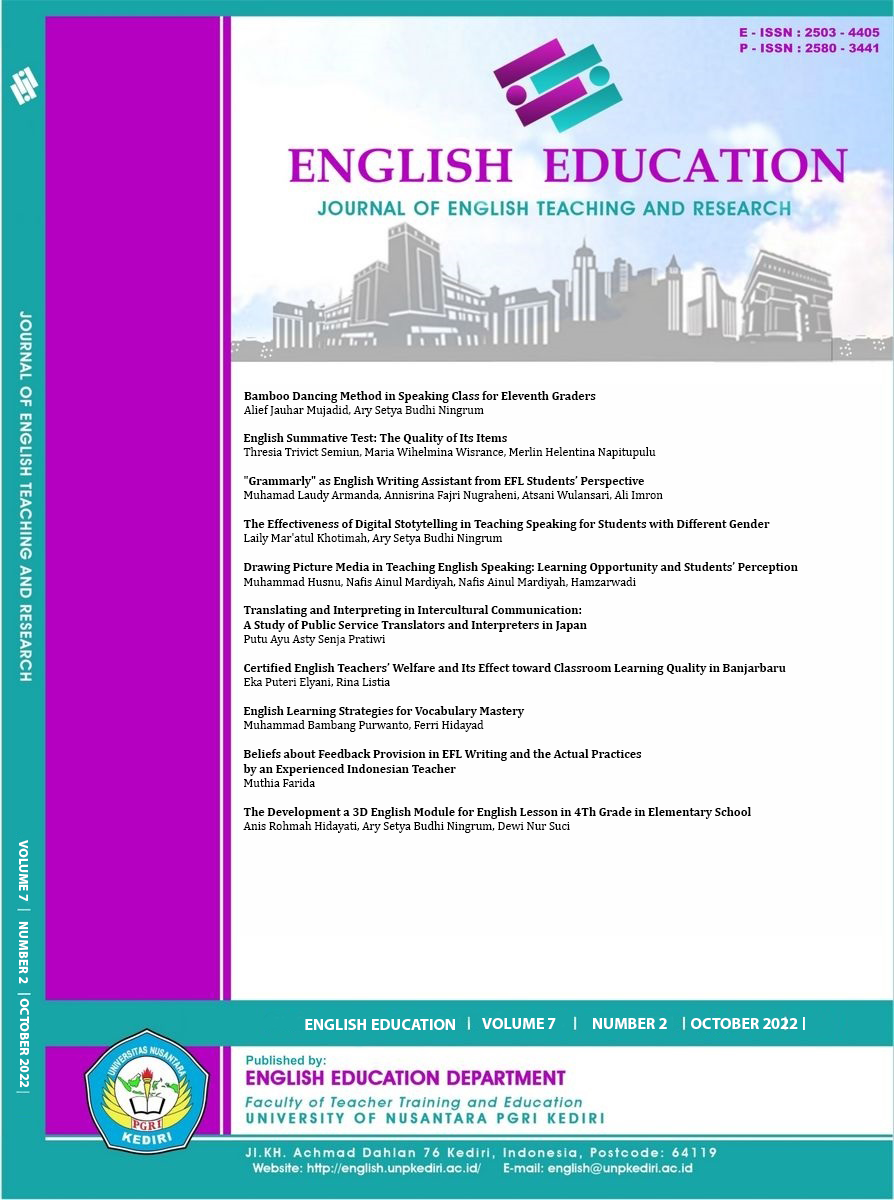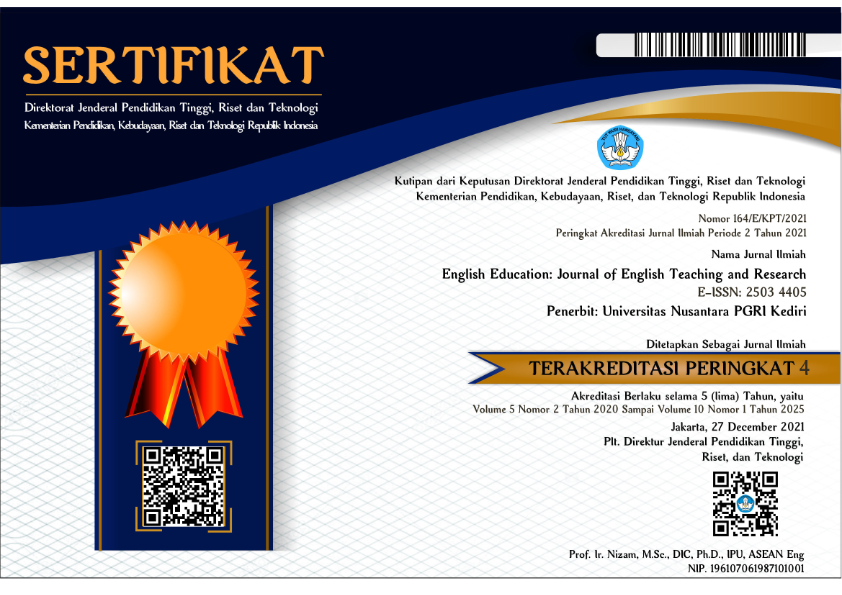Certified English Teachers’ Welfare and Its Effect toward Classroom Learning Quality in Banjarbaru
DOI:
https://doi.org/10.29407/jetar.v7i2.18416Keywords:
certified English teacher, teacher's welfare, classroom learning quality improvementAbstract
Teachers’ involvement in the process of education has a significant influence on the quality of educational outcomes.Teachers' performance in the teaching and learning process are expected to improve as teachers' welfare is improved. Improving teachers' welfare can then have a positive impact on improving teacher quality conceptually and in practice. As a result, teachers’ certification comes as the new spirit given from the government to improve teachers’ performance in the classroom. This study aims at investigating the impact of teachers' welfare enhancementon their learning performance in the classroom. This study employs descriptive qualitative research that describes the effect of teachers’ certification allowances on the improvement of teaching and learning quality in the classroom. The participants of this study are 30 teachers from the representative of MGMP teachers in Banjarbaru who have accepted teacher professional allowance. Moreover, questionnaire, interview, and observation are taken to collect the data.According to the findings, all certified teachers at the junior high, senior high, and vocational high school levels have already understood the meaning of pedagogical and professional competence that they use to deliver the material in the classroom; in general, teachers have well prepared the material. Teachers use teaching materials that are relevant to the syllabus and students' needs, allowing them to teach in accordance with Graduate Competency Standards (SKL). Certified English teachers also have already mastered the theories and principles of effective learning that are being taught in the classroom. In a nutshell, there is a correlation between certified English teachers' welfare and the improvement of classroom learning quality.
Downloads
References
Anif, S., Sutama, Prayitno, H. J., & Idrus, N. B. M. (2019). Effectiveness of pedagogical competence: A development model through association of biology teachers’ forum. Jurnal Pendidikan IPA Indonesia, 8(1), 22–31. https://doi.org/10.15294/jpii.v8i1.17176
Emiliasari, R. N. (2018). an Analysis of Teachers’ Pedagogical Competence in Lesson Study of Mgmp Smp Majalengka. ELTIN JOURNAL, Journal of English Language Teaching in Indonesia, 6(1), 22. https://doi.org/10.22460/eltin.v6i1.p22-33
Hidayat Ada, J., & Azisah, S. (2016). the Contribution of Teachers’ Pedagogical Competence Toward the Effectiveness of Teaching of English At Mtsn Balang-Balang. ETERNAL (English, Teaching, Learning and Research Journal), 2(2), 238–251. https://doi.org/10.24252/eternal.v22.2016.a5
Kholis, N. (2019). Teacher Professionalism in Indonesia, Malaysia, and New Zealand. TARBIYA: Journal of Education in Muslim Society, 6(2), 179–196. https://doi.org/10.15408/tjems.v6i2.11487
Kusumawardhani, P. N. (2017). Does teacher certification program lead to better quality teachers? Evidence from Indonesia. Education Economics, 25(6), 590–618. https://doi.org/10.1080/09645292.2017.1329405
Madya, S. (2005). Certificatioii for Teachers and Lecturers and Its Implications : I(1).
Mansir, Firman. (2019). Implications of teacher Certification on Professionalism and Welfare of 21th Century PAI Teahers. Jurnal Pendidikan Agama Islam, 5(2), 138-152.
Ningsih, I., Vianty, M., & Inderawati, R. (2015). Teaching and learning performance: The perception of the certified English teachers. Journal of English Literacy Education, 1(2), 25–39.
Rahman, M. H. (2014). Professional Competence , Pedagogical Competence and the Performance of Junior High School of Science Teachers. Journal of Education and Practice, 5(9), 75–80. www.iiste.org
Setiawati, L. (2020). Impact of Teacher Certification Toward Learning Quality: A Case Study in Elementary School. 112, 151–154. https://doi.org/10.2991/aebmr.k.200108.036
Shakir, N. (2013). Impact of Reward on Teachers ’ Performance at Secondary Level. Journal of Education and Practice, 5(4), 107–112.
Utami, I. G. A. L. P. (2015). Teacher Certification Program in Indonesia: Problems and Recommendation for the Betterment of the Program. International Journal of English and Education, 4(2), 471–481.
Wahyudi, K. E. D. O. (2012). Measuring Performance of Teacher Certification Program. International Journal of Administrative Science & Organization, 19(3), 153–161.
Yamin, M. 2009. Manajemen Mutu Kurikulum Pendidikan. Yogyakarta: Diva Press.
Downloads
Published
Issue
Section
License
Authors who publish with this journal agree to the following terms:
- Copyright on any article is retained by the author(s).
- The author grants the journal, the right of first publication with the work simultaneously licensed under a Creative Commons Attribution License that allows others to share the work with an acknowledgment of the work’s authorship and initial publication in this journal.
- Authors are able to enter into separate, additional contractual arrangements for the non-exclusive distribution of the journal’s published version of the work (e.g., post it to an institutional repository or publish it in a book), with an acknowledgment of its initial publication in this journal.
- Authors are permitted and encouraged to post their work online (e.g., in institutional repositories or on their website) prior to and during the submission process, as it can lead to productive exchanges, as well as earlier and greater citation of published work.
- The article and any associated published material is distributed under the Creative Commons Attribution-ShareAlike 4.0 International License








 Article template
Article template



